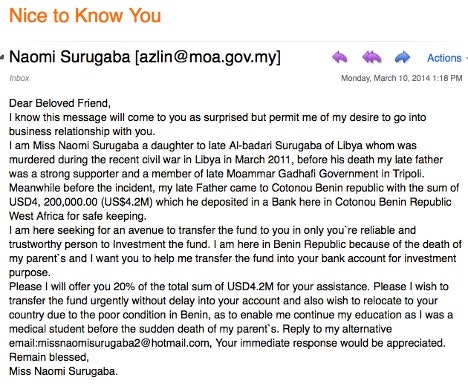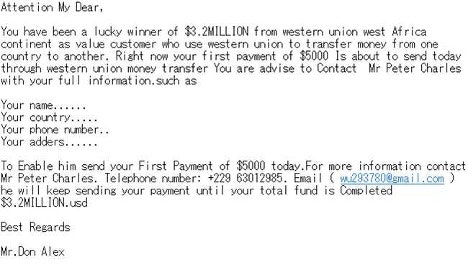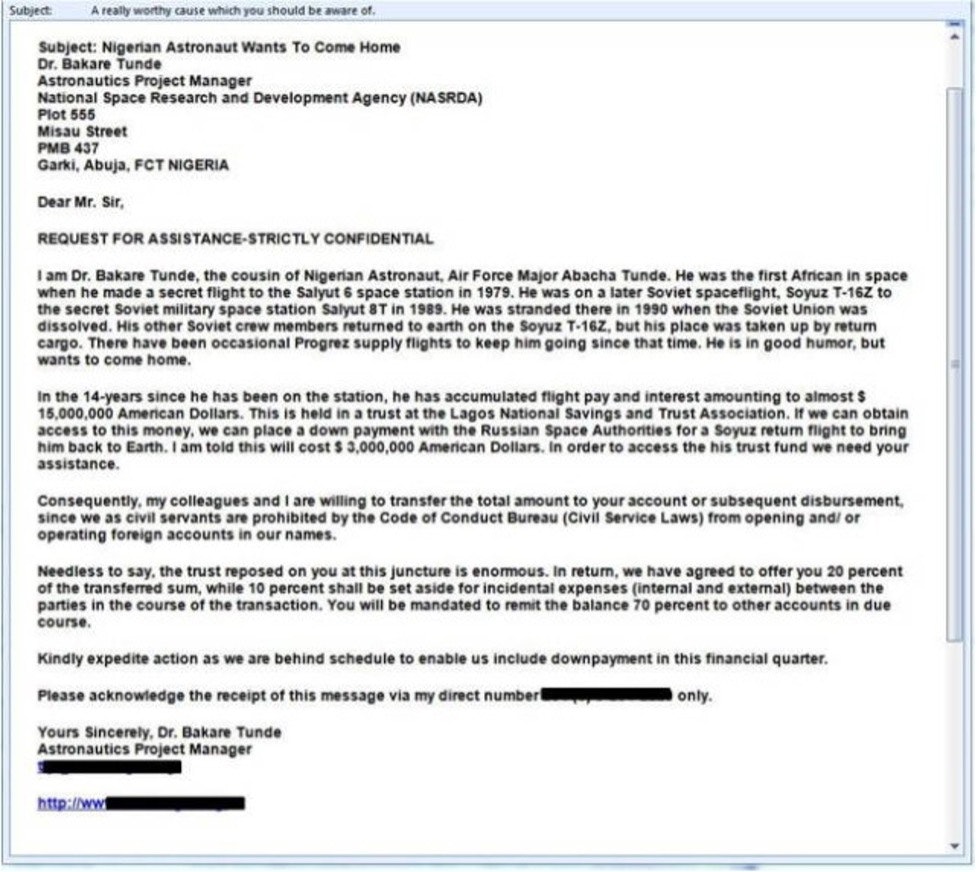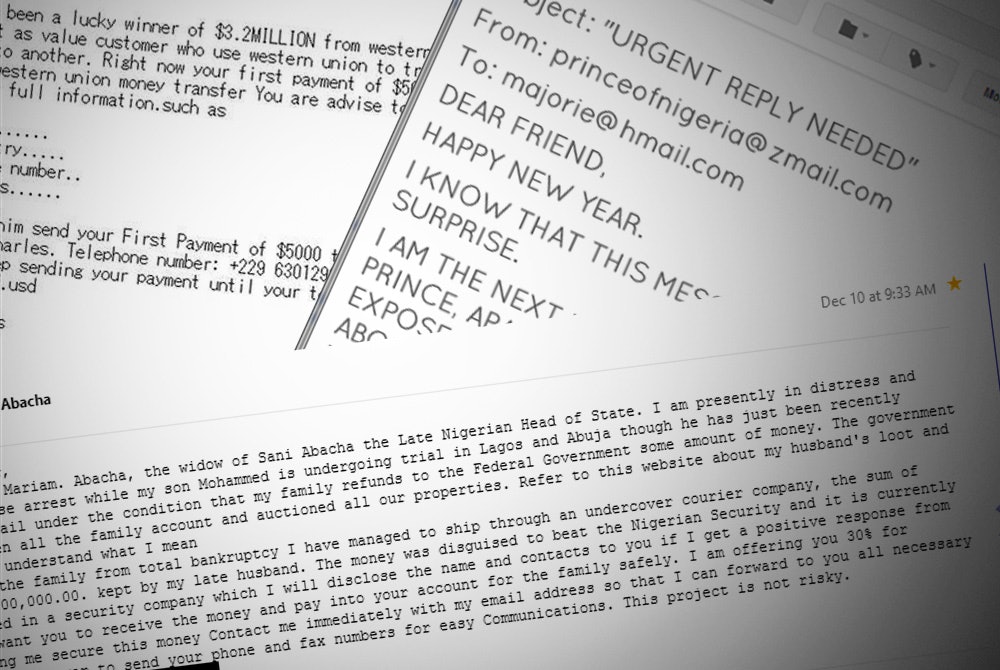- What is the Nigerian Prince Scam?
- Red Flags of Nigerian Prince Scams
- What to Do After Receiving a Nigerian Prince Email
- Examples of Nigerian Prince Scams
- Fallen for this Scam?
The Nigerian Prince scam is one of the oldest and most well-known scams on the Internet today and still one of the most effective. Also known as the "419 scam" (in reference to the Nigerian penal code that handles these crimes), these scams cost each victim an average of $2,133, according to a 2019 report from ADT Security Services.
What is the Nigerian Prince Scam?
A Nigerian Prince email typically opens with an incredible investment opportunity or a request for your help so a foreigner can leave his country. You'll either provide your bank account number so the person can transfer the money to you, or you'll pay a small advance payment/fee to cover the costs of an international transfer (or other admin fees). Unfortunately, the money you're promised never arrives, and you can end up losing a lot more in the process.
As simple as this scam may be, it continues to trick thousands of people each year. Here's how the scam works and how it's evolved over the years.
You Receive an Email from a Sender You Don't Recognize
You receive an email from an unknown sender who pretends to be in a position of wealth and power, perhaps a member of the Nigerian royal family. The person either has a lucrative investment opportunity or an urgent problem at hand—either way, they need to move a large sum of money out of their country and need your help. In return, you'll receive a share of the sum. The problem they refer to might be political unrest, corruption, or war.
Whatever the story, the end goal will be the same: to have you send them money or your bank account details in exchange for a large sum of money.
Example Nigerian Prince LetterURGENT BUSINESS PROPOSAL
We have thirty million U.S. dollars which we got from over inflated contract from crude oil contract awarded to foreign contractors in the Nigerian National Petroleum Corporation (NNPC). We are seeking your assistance and permission to remit this amount into your account. Your commission is thirty percent of the money.
Please notify me your acceptance to do this business urgently. The men involved are men in government. More details will be sent to you by fax as soon as we har from you. For the purpose of communication in this matter, may we have your telefax, telex and telephone numbers including your private home phone telephone number.
Contact me urgently through the fax number above.
Please treat as most confidential, all replies strictly by DHL courier, or through above fax number.
Thanks for your co-operation.
Yours faithfully,
Prince Jones Dimka
In recent updates to the scam, the person will likely be from another country but doesn't necessarily have to be from Nigeria. The situations can vary, involving lottery winners who must share their winnings or someone discovering their inheritance has been trapped in a bank due to civil unrest. Sometimes, scammers who meet others on dating websites eventually asking for their bank account information fall under the "Nigerian prince email" or "foreign money exchange" category of scams.
The Sender Asks for Your Bank Account Number and/or Money
The person says they'll gladly share the money with you, but you'll have to send your bank account number so they can transfer the money "for safekeeping." Or they might ask for a small advance payment to cover taxes or bank fees. In more updated versions of the Nigerian prince scam, the scammer might ask for money via:
- Wire transfer
- International fund transfer
- Cash-reload card
- Cryptocurrency
You Send the Money
Expecting a significant windfall for your efforts, you provide your bank account number or send the small advance payment via the requested method and wait for the payoff.
The Scammer Takes Your Money and Disappears
Instead of rewarding you with a sizable fortune, the scammer disappears with your money. Your bank account may also be compromised, leaving you vulnerable to further financial theft. In addition, if you have shared other personal details, such as your Social Security number and birth date, you could also be at risk of identity theft.
Sometimes, the scammer might stay in contact with you for a few months and continue to string you along, asking for more advance fees and promising future financial rewards.
Red Flags of Nigerian Prince Scams
Nigerian prince email scams have continued to thrive through the years as scammers continually improve and revamp their methods. Knowing how to identify this scam will help you protect yourself and your money from scammers. Red flags of this scam to watch out for include:
- An email from a foreign dignitary or executive: The email originates from an unknown sender, who claims to be a foreign dignitary or executive based in Nigeria.
- The promise of unrealistic amounts of money: A major red flag of this scam is the promise of a significant payoff if you follow along with the scammer's plan.
- A sense of urgency: These Nigerian prince emails always come with a sense of urgency. The scammer is dealing with some emergency and needs you to respond quickly.
- Use of flattery and religious appeals: The Nigerian prince email might claim you've come highly recommended by an associate, and you've been chosen for this opportunity for that reason.
- Assurance of safety: The scammer will likely try to convince you that the transaction will be safe and "100% risk-free."
- Poor grammar, poor spelling, and awkward phrasing: The emails very deliberately use poor grammar and spelling to sound as if they're foreigners with a poor grasp of the English language when in reality, the scammers are often fluent English speakers. They use these tactics to make their plea for help seem sadder and more believable. They might also use overly flowery language in an attempt to sound more official.
- Impersonal greetings: The Nigerian prince emails tend to open with impersonal greetings such as "Dear Mr. Sir" or "Dear Beloved Friend." The emails never open with your actual name. That's a major red flag that you're dealing with someone you don't know.
What to Do After Receiving a Nigerian Prince Email
Senders of Nigerian prince emails are preying on people's natural sense of decency to help out someone they don't know. Or the emails propose a tempting investment opportunity with little risk and high reward.
You should always use caution when you receive an email from someone you don't know.
Don't Respond
If you receive an email from an unknown sender, especially someone who claims to be from Nigeria or another country, do not reply, even if you are just curious and want to find out more, without any intention of sending money.
You should immediately delete the email or report it as spam. Answering the email confirms that your email address works, so that you may be at risk of receiving more scam emails.
Mark As Spam
Make sure you've activated spam filtering in your email account—this will stop most scam emails from appearing in your inbox in the first place. If one does get through, mark it as "spam."
Ignore Promises of Fortunes or Investment Opportunities
Nigerian prince emails may make the investment opportunity or financial rewards sound incredibly enticing, but don't take the bait. You won't receive any legitimate offers of money via email from unknown senders, especially those in overseas locations.
Don't Provide Money to People You Haven't Met in Person
Whether the person initially contacted you via email, social media, or a dating app, never entertain any requests for you to send them money. If you haven't met them in person, you don't know if the person is who they claim to be.
Even if you have talked to someone for months online, it's a sure sign of a scam if they eventually start asking for money.
Don't Share Personal Details Online
Use caution when sharing any details about your location or personal identity online, especially your banking and credit card information.
Don't Send Personal Information Over Email
Don't ever provide your bank account details or credit card information over email. Even if you're giving it to someone you know, either of your emails could be compromised by hackers, putting your money at risk.
Examples of Nigerian Prince Scams
Nigerian prince emails may continue to change with the times but tend to follow a similar template.
In the below example, the scammer follows the classic pattern—an urgent situation involving a civil war and a considerable sum of money, which requires the assistance of someone outside the country who will eventually earn a piece of the fortune. Note the urgent, distressed tone of the sender and the language style of a non-native English speaker.

In another version of the scam, you'll receive an email advising you that you're the lucky winner of a lottery or contest. The message is deliberately short on details about the actual circumstances of your unexpected win, but banks on the appeal that you'll be curious enough to provide your personal and financial information.

The following example is a twist on the typical Nigerian prince scam. The characters have changed—in this case, the sender is asking for money to help bring a Nigerian astronaut home—but the threat is the same. The scammer is still asking for money, promising the victim they'll receive a portion of the sum in the end in return for their assistance.

Fallen for this Scam?
Nigerian prince email scams have successfully fooled thousands of people into handing over their money and personal details. If you fall victim to this scam, you're not alone—the earlier you take action to protect your financial and personal identity, the better the chances of preventing further damage. Here are the steps to take next.
Contact the U.S. Secret Service
The U.S. government takes these international scams seriously. If you have already responded to a Nigerian prince email, contact the FBI or U.S. Secret Service:
- By calling: 202-406-5572
- By emailing: [email protected]
Guard Your Accounts
Contact your financial institution or credit card company immediately to let them know you've been the victim of a fraudulent international transfer. They may be able to investigate the fraud and return the funds to you, or at least cancel your card and protect you from further fraudulent transfers.
Request a Fraud Alert or Credit Freeze
If you believe the scammers may have access to crucial personal and financial details, you can take steps now to protect your identity. First, you can request that any of the three credit bureaus place a fraud alert on your credit report, which will last for one year. That will make it significantly harder for someone to open a new credit account in your name.
In more extreme cases, you can also choose to freeze your credit so that no one, including you, can open a new credit account in your name while the freeze is in place.
Change Your Passwords
To be on the safe side, change all of your passwords on your online accounts. In addition, enable two-factor authentication on as many accounts that allow it to make it that much harder for scammers to gain access to your funds.


Comments